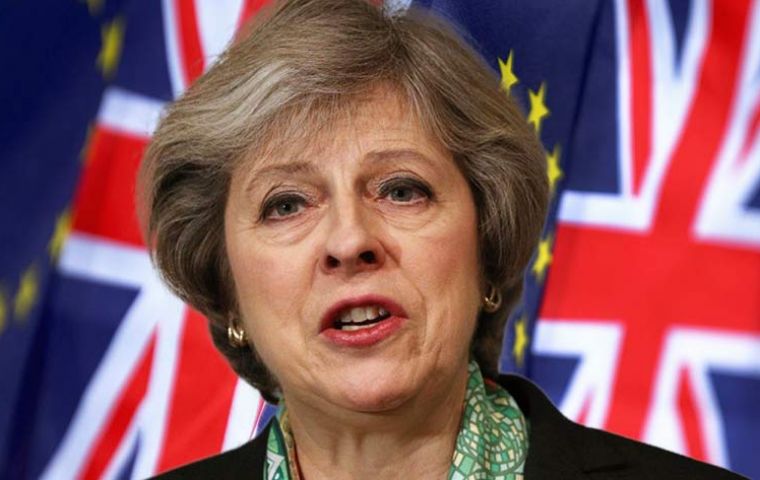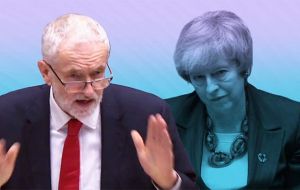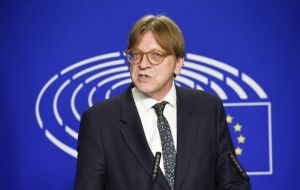MercoPress. South Atlantic News Agency
Brexit negotiations deadline on course to be extended
 UK is on course to leave the European Union on March 29 without a deal unless Theresa May can persuade the bloc to amend the divorce deal
UK is on course to leave the European Union on March 29 without a deal unless Theresa May can persuade the bloc to amend the divorce deal  The leader of the opposition Labour Party, Jeremy Corbyn, accused her of running down the clock with sham negotiations to pressure parliament into backing her deal.
The leader of the opposition Labour Party, Jeremy Corbyn, accused her of running down the clock with sham negotiations to pressure parliament into backing her deal.  But Guy Verhofstadt, the European Parliament’s Brexit point-man, said he has yet to hear of a proposal to break the deadlock
But Guy Verhofstadt, the European Parliament’s Brexit point-man, said he has yet to hear of a proposal to break the deadlock Prime Minister Theresa May asked lawmakers on Tuesday to hold their nerve over Brexit and give her more time to negotiate a deal acceptable to both the European Union and the British parliament.
The United Kingdom is on course to leave the European Union on March 29 without a deal unless May can persuade the bloc to amend the divorce deal she agreed last year and get it approved by British lawmakers.
“The talks are at a crucial stage”, May told parliament. “We now all need to hold our nerve to get the changes this House requires and deliver Brexit on time”.
The leader of the opposition Labour Party, Jeremy Corbyn, accused her of running down the clock with sham negotiations to pressure parliament into backing her deal.
After talks in Strasbourg at the European Parliament, UK Brexit minister Stephen Barclay said there was “a lot of goodwill on both sides” to achieve a deal.
However, Guy Verhofstadt, the European Parliament’s Brexit point-man, said he has yet to hear of a proposal to break the deadlock. “What are these negotiations at a ‘crucial state’ raised in the House of Commons? The way forward is cross-party, not kicking the can towards a disastrous no deal”, he said on Twitter
May’s hopes of delivering an on-time Brexit were also undermined by an ITV news report which cited Britain’s lead negotiator Olly Robbins as being overheard in a Brussels bar saying: “In the end, they (the EU) will probably just give us an extension”.
British lawmakers rejected May’s withdrawal deal last month, with the major sticking point being the Irish “backstop” – an insurance policy to prevent the return of a hard border between British province Northern Ireland and EU-member Ireland.
Critics of the backstop say it could leave Britain subject to EU rules for years after leaving the bloc or even indefinitely.
The EU says the backstop is vital to avoiding the return of border controls in Ireland and has refused to reopen the Brexit divorce deal, though May insists she can get legally binding changes to replace the most contentious parts of the backstop.
“By getting the changes we need to the backstop; by protecting and enhancing workers’ rights and environmental protections; and by enhancing the role of parliament in the next phase of negotiations I believe we can reach a deal that this House can support”, May said.
The EU’s Brexit negotiator, Michel Barnier, said on Monday the bloc would agree to tweak the political declaration on post-Brexit EU-UK ties that forms part of the exit package, to reflect a plan for a closer future relationship that could remove the need for the backstop.
May is pursuing three options in talks with Brussels: negotiating a way for Britain to leave the backstop without needing EU agreement, agreeing a time limit to the backstop, or finding an alternative arrangement that replaces it altogether.
Parliament is to hold a debate on Brexit on Feb 14 but with just 45 days until Britain leaves the bloc it is not expected to change the course of the exit process, and no date has been set for another vote to approve or reject May’s deal.
May said that if she had not yet reached a deal in Brussels, she would deliver another progress report on Feb 26 and provide another chance for parliament to express its opinion on her approach the following day.
She said she was prepared to speed up other parts of the ratification process of the Brexit deal if time gets too tight to pass legislation before exit day – a move some interpreted as a sign she was willing to keep negotiating until the last moment.




Top Comments
Disclaimer & comment rulesCommenting for this story is now closed.
If you have a Facebook account, become a fan and comment on our Facebook Page!